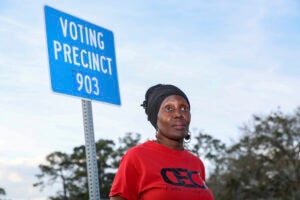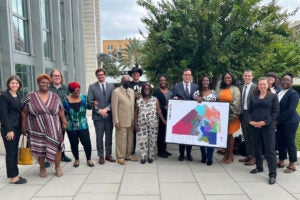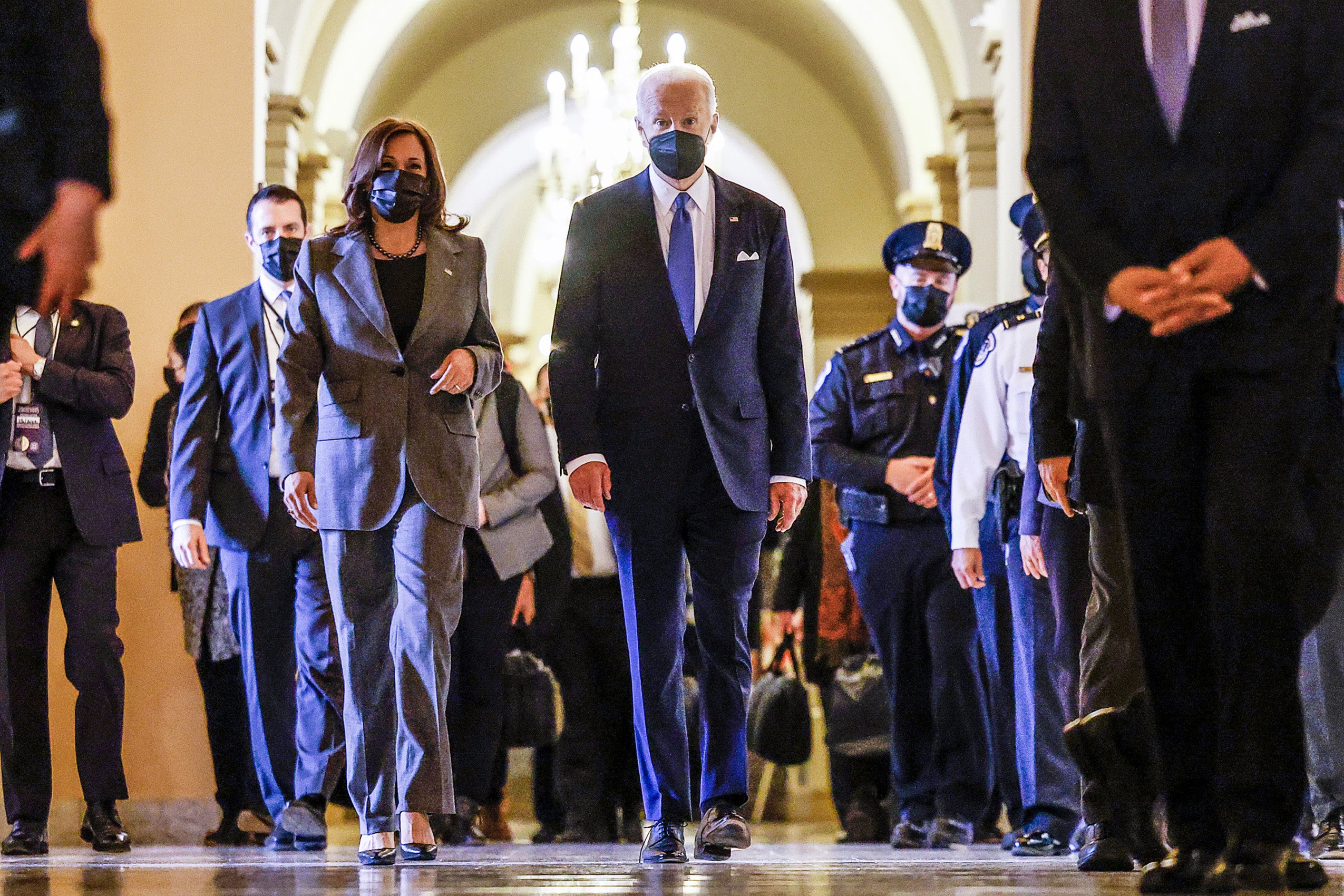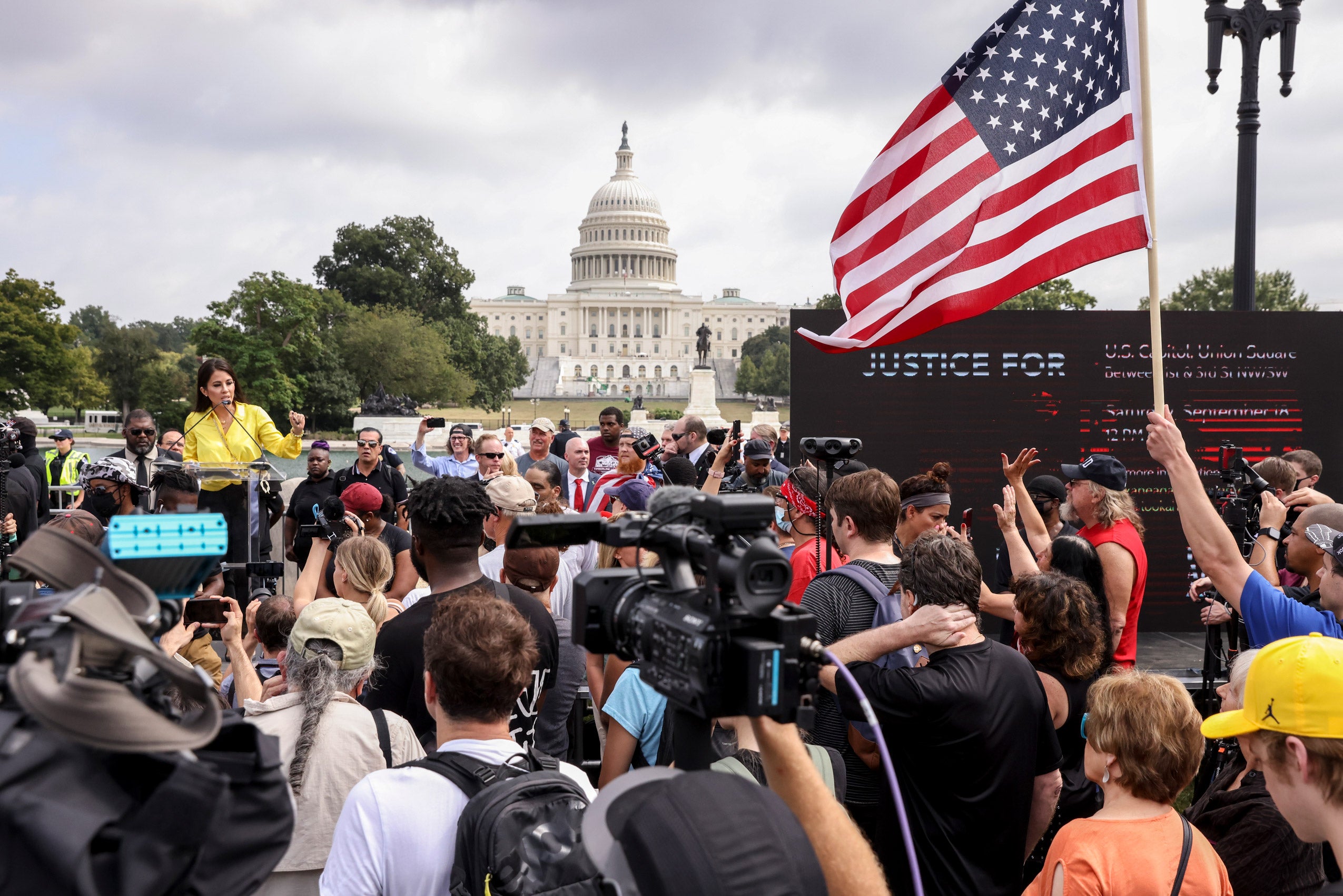People
Ruth Greenwood
-
Lawsuit seeks Wisconsin Supreme Court’s help on changing GOP-drawn legislative voting maps
August 4, 2023
Another battle over legislative district voting maps is underway in Wisconsin. A liberal-leaning legal coalition representing 19 state residents has filed a lawsuit. The suit…
-
A credible case can be made that the Supreme Court’s decision last June to eliminate the constitutional right to an abortion was crucial to the…
-
Notes and Comment
March 29, 2023
At this spring's Notes and Comment event, dozens of Harvard Law students working on writing projects met with faculty experts for advice and commentary on their work.
-
A matter of ‘life or death’
February 7, 2023
Harvard Law School’s Election Law Clinic partners with organizers in Jacksonville, Florida to score important victories for voting rights.
-
Election Law Clinic presents oral arguments in Jacksonville racial gerrymandering case
September 26, 2022
On Friday, September 16, Election Law Clinic clinical instructor Daniel Hessel led the plaintiff’s oral arguments during Jacksonville Branch of the NAACP v. City of Jacksonville’s preliminary injunction hearing, arguing against the use of racially biased redistricting maps in the 2023 and 2024 city council and school board elections.
-
A Focus on Democracy: HLS Clinics and Classes
July 15, 2022
The Election Law Clinic, led by Ruth Greenwood, visiting assistant clinical professor, focuses on voter suppression, gerrymandering, and the challenges money poses to democratic participation.
-
Weighing President Biden’s first year
January 18, 2022
In this series, Harvard Law experts turn a critical eye to the Biden administration’s efforts on health care, the economy, criminal justice reform, and other areas important to Americans — and share their thoughts on its agenda for the future.
-
Weighing President Biden’s first year: Voting and elections
January 11, 2022
Harvard Law School election law expert Ruth Greenwood applauds the Biden administration’s support for new voting legislation, but says the filibuster remains an obstacle to finishing the job.
-
Challenges to the Voting Rights Act far from over
December 2, 2021
When the U.S. Supreme Court decided an important voting rights case earlier this year, its ruling made it more difficult for voters to challenge restrictive state voting laws. Now, the state of Texas is making an argument that, if adopted, would further hobble use of what remains of the Voting Rights Act. ...In a one-paragraph concurring opinion in Brnovich v. Democratic National Committee, the voting rights case decided last summer, Supreme Court Justice Neil Gorsuch said the court’s previous cases assumed that private parties had the right to bring lawsuits challenging state election laws under Section 2 of the VRA, but it was an “open question” the Supreme Court had not yet decided. Justice Clarence Thomas was the only other member to sign on to Gorsuch’s concurrence. “If it hadn’t been for the Gorsuch line in Brnovich, I would have thought it was kind of a crazy argument,” said Ruth Greenwood, director of the Election Law Clinic at Harvard Law School, of the Texas brief.
-
The final proposal for Wisconsin’s next political maps from Democratic Gov. Tony Evers’ redistricting commission would narrow, but still maintain, Republican legislative and congressional majorities in the state. ... Ruth Greenwood, director of the Election Law Clinic at Harvard Law School, said she doesn’t believe the commission’s maps are fair for Democratic voters, adding that predicted efficiency gaps “show a large and durable skew in favor of Republican voters” for both the Assembly and Senate map proposals. PlanScore, a program that predicts precinct-level votes for districts based on past election results and U.S. Census data led by the Campaign Legal Center, a national nonprofit organization that advocates for nonpartisan maps, found that under the commission’s proposal Democratic candidates would take 35% of state Senate seats and 39% of Assembly seats with a near 50-50 Democratic and Republican vote share. Greenwood said this may be due to the commission’s prioritization of compactness over partisan fairness. Greenwood noted that the first priority Evers listed in his original executive order creating the commission was that maps shall, whenever possible, be “free from partisan bias and partisan advantage.” “That is not reflected in the resulting plans,” Greenwood said. Greenwood said last month Republicans’ proposal “essentially bakes in almost the same level of partisan advantage” as current districts.
-
Senate committee holds public hearing on GOP-drawn maps
October 28, 2021
A Senate committee will take public comment Thursday on the Republican proposal for [Wisconsin's] next 10-year political boundaries, maps that would likely ensure another decade of GOP majorities in the state Legislature. For Republicans, the GOP proposal for the state's legislative and congressional boundaries aligns with plans to retain the core of existing districts, but for Democrats and those seeking nonpartisan maps, the offering is just more of the same. ... PlanScore, a program that predicts precinct-level votes for districts based on past election results and U.S. Census data led by the Campaign Legal Center, a national nonprofit organization that advocates for nonpartisan maps, found the GOP proposal "essentially bakes in almost the same level of partisan advantage" as current districts, said Ruth Greenwood, director of the Election Law Clinic at Harvard Law School.
-
Just how partisan are the GOP ‘nonpartisan’ maps?
October 22, 2021
Republican legislative leaders unveiled their proposed redistricting maps Wednesday, as did the People’s Maps Commission, which provided updated versions of draft maps it had previously released. Both the GOP and the commission — formed by Democratic Gov. Tony Evers but made up of a diverse group of community members who drew on extensive public input — say their maps are fair and nonpartisan. Democrats jumped on Republicans’ maps, put forward in a redistricting bill, as being overtly partisan and even more gerrymandered than the maps that have been in place for the last decade. Over the past 10 years, Republicans in the Assembly, who received less than half of the total votes statewide, secured around two-thirds of the districts thanks to the maps they drew after the last census. ... Ruth Greenwood, director of Harvard Law School’s Election Law Clinic and a self-declared “map enthusiast” and “political junkie” used the PlanScore and said that the Legislature’s maps “would almost certainly ensure a GOP majority in the Legislature for another decade.” Greenwood ran the GOP-drawn maps through PlanScore — a program that predicts precinct-level votes for districts based on past election results and U.S. Census data — and labeled the maps as unfair. PlanScore uses four metrics, and the Wisconsin GOP’s legislative maps in all four categories were labeled as having “a Republican skew.”
-
Republicans unveil proposed redistricting maps based largely on existing boundaries
October 21, 2021
Republican leaders on Wednesday unveiled their proposal for legislative and congressional district maps, which received immediate criticism for being based largely on existing GOP-drawn districts that have helped Republicans hold strong majorities in both chambers. As Republicans had promised, the GOP proposal would largely align with existing boundaries for legislative and congressional districts, according to an analysis by the nonpartisan Legislative Reference Bureau. The Legislature must redraw political lines every decade based on the latest population figures from the U.S. Census Bureau. The mapmaking process can provide an advantage for the majority party based on how district lines are drawn. ... The proposed maps would almost certainly ensure a GOP majority in the Legislature for another decade, said Ruth Greenwood, director of the Election Law Clinic at Harvard Law School. Greenwood ran the GOP-drawn maps through PlanScore — a program that predicts precinct-level votes for districts based on past election results and U.S. Census data. “I’d say it’s as extreme as the gerrymander for the last 10 years,” Greenwood said. “It essentially bakes in almost the same level of partisan advantage and so we would expect to see another decade where it wouldn’t matter whether more people voted for Democrats than Republicans, Republicans would still maintain control.”
-
Could math that dates back to secret US atomic bomb labs help curb gerrymandering in NC?
October 8, 2021
It’s redistricting time in North Carolina. That’s when lawmakers will slice and dice our state into election districts that account for population shifts. How those lines are drawn can tip the balance of power here and in Congress. In a limited-run podcast from Under the Dome, we explore how lawmakers draw these maps, their impact on power in North Carolina’s political landscape and how new tools are changing the fight against gerrymandering. Part 3, Math on the front lines, is now available for streaming. Ruth Greenwood featured in Part 3.
-
Redistricting advocates hoping for fair maps after commission analysis found GOP lean
October 5, 2021
After a consultant told Michigan’s redistricting commission that its current draft maps for legislative districts would still largely favor Republicans, advocates who pushed to reform the state’s redistricting process say it’s imperative for the commission to land on competitively balanced maps. ... During Monday’s briefing, Ruth Greenwood, director of the Election Law Clinic at Harvard Law School, highlighted several draft maps that would achieve desired efficiency ratings. Given Michigan’s traditionally competitive statewide races, Greenwood said it’s possible to draw competitive legislative lines while still respecting communities of interest, which refers to groups with historical similarities in close proximity to one another. “I think that it would just be naive to say that the political geography of Michigan doesn't allow for partisan fairness to be enforced,” Greenwood said.
-
WATCH: Speakers from Voters Not Politicians, Harvard Law discuss redistricting process
October 4, 2021
Speakers from Voters Not Politicians, the group that wrote and helped pass the constitutional amendment establishing the Michigan Independent Citizens Redistricting Commission, discussed Monday the state's redistricting process. They were joined by a speaker from Harvard Law [Ruth Greenwood, visiting assistant professor of law and director of the Election Law Clinic].
-
Is democracy in peril?
September 23, 2021
The state of American democracy will be examined in a lecture series, "Democracy," which had its first session this week and will continue through the fall and spring.
-
Facing tight timeline, voter-led Michigan redistricting commission on steep learning curve
September 17, 2021
Michigan's first-ever citizen redistricting commission is finding itself on a steep learning curve as members race against the clock to draw new maps ahead of the 2022 election, crunching a months-long process into a matter of weeks following an unprecedented delay in census data. ... While some states include competitiveness in their redistricting criteria, the commission isn’t required to draw districts that ensure that candidates from each political party have an equal chance of winning. But the maps overall can’t give any party a leg up. The result is that Democratic and Republican voters will be treated fairly, said Ruth Greenwood, the director of the Election Law Clinic at Harvard Law School, said during a recent event held by Voters Not Politicians. While those who make up a political minority in their district might not feel represented by the legislator from their district, Greenwood noted that individual voters are also represented by the entire legislative body. "When they make a decision, it doesn’t matter what your rep has said, it matters what the whole body does," she said.








